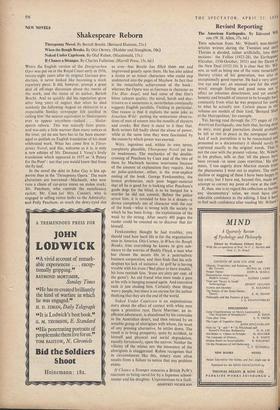NEW NOVELS
Shakespeare Reborn
Threepenny Novel. By Bertolt Brecht. (Bernard Hanison, 21s.) If Chance a Stranger. By Charles Fullerton. (Harvill Press, 13s. 6d.)
WHEN the English version of the Dreigroschen Oper was put on at the Royal Court early in 1956, twenty-eight years after its original German pro- duction, it never looked like becoming a stock repertory piece. It did, however, prompt a great deal of off-stage discussion about the merits of the work, and the status of its author, Bertolt Brecht. And so quickly did his reputation grow after long years of neglect that when he died suddenly the following August an obituarist in a respectable Sunday newspaper felt justified in calling him 'the nearest equivalent to Shakespeare ever to appear anywhere—indeed . . . Shake- speare reborn.' This was scarcely faint praise, and was only a little warmer than many notices at the time; yet no one here has so far been encour- aged to publish an English translation of his most celebrated work. What has come first is Three- penny Novel; and this, welcome as it is, is only a new edition of Mr. Desmond I. Vesey's lively translation which appeared in 1937 as 'A Penny for the Poor' : not that you would know that from the fly-leaf.
In the novel the debt to John Gay is less ap- parent than in the 'Threepenny Opera.' The main characters are borrowed—Macheath, who now runs a chain of cut-price stores on stolen stock; Mr. Peachum, who controls the mendicancy racket; Mr. Coax (ne Mrs. Coaxer), who is engaged in selling rotten hulks to the Admiralty; and Polly Peachum, as much the dewy-eyed slut as ever—but Brecht has filled them out and improvised greatly upon them. He has also added a dozen or so minor characters who could step undetected into the pages of Mayhew. In fact that is the remarkable achievement of the book : whereas the Opera was as German in character as The Blue Angel, and had some of that film's bitter cabaret quality, the novel, harsh and doc- trinaire as it sometimes is, nevertheless continually suggests English parallels, Fielding in particular. One reason is that it exploits the same joke as Jonathan Wild: putting the sententious observa- tions of men of esteem into the mouths of shysters and crooks. But there is more to it than that. Both writers felt badly about the abuse of power, while at the same time they were fascinated by the means by which power was exerted.
Witty, ingenious and, within its own terms, completely plausible, Threepenny Novel yet has its weaknesses. The mechanics of the double- crossing of Peachum by Coax and of the two of them by Macheath become wearisome because of the amount of explanation they require. And no pulse-quickener, either, is the over-explicit ending of the book. George Fewkoombey, the honest proletarian, such poor beggar-material that all he is good for is looking after Peachum's guide dogs for the blind, is to be hanged for a murder he did not commit. Before the police arrest him, it is revealed to him in a dream—a device completely out of character with the rest of the book—what is wrong with the society in which he has been living : the 'exploitation of the weak by the strong. After nearly 400 pages the reader could be counted on to discover that for himself.
Fewkoombey thought he had troubles; you should read how hard life is for the organisation man in America. Otis Carney, in When the Bough Breaks, tries everything he knows to give sub- stance to the worries of Buddy Floyd, a man who has chosen the secure life in a paternalistic business corporation, and then finds that his wife despises his lack of initiative. At golf he is having trouble with his irons ('Bad place to have trouble,' his boss reminds him. 'Irons are sixty per cent. of the game'). An old friend who once made a pass at his wife is hanging around again. And executive rank is just eluding him. Certainly these things worry people; but there is no excuse for the author thinking that they are the end of the world.
Naked Under Capricorn is an unpretentious story about the effect of contact with white men upon a primitive race. Davis Marriner, an in- efficient adventurer, is abandoned by his comrades in the Australian desert, and then rescued by an amiable group of aborigines with whom, for want of any pressing alternative, he settles down. The result is to bring prosperity, quite by accident, to himself and physical and social degradation, equally fortuitously, upon the natives. Neither the villainy of the whites nor the innocence of the aborigines is exaggerated. Ruhen recognises that in circumstances like this, misery most often results from a failure to notice that any problem exists.
If Chance a Stranger concerns a British PoW's reactions to being cared for by a Japanese school- master and his daughter. Unpretentious to a fault.
GEOFFREY NICHOLSON














































 Previous page
Previous page